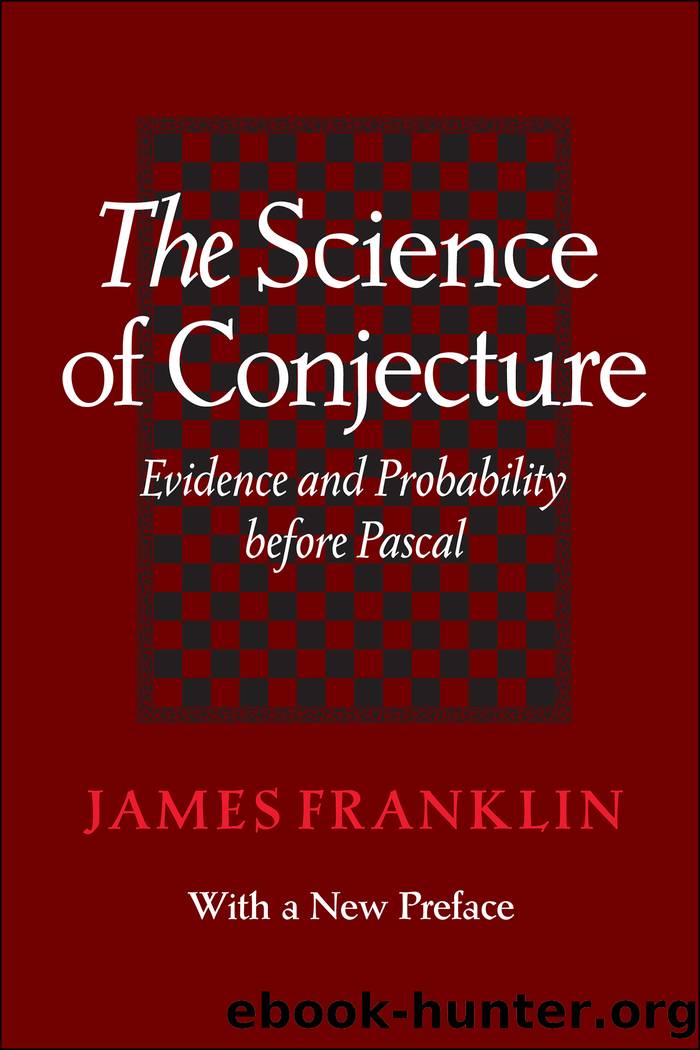The Science of Conjecture by James Franklin

Author:James Franklin
Language: eng
Format: epub
Publisher: Johns Hopkins University Press
Published: 2015-02-14T16:00:00+00:00
Pascalâs Wager
Arguments with a broad similarity to Pascalâs wager are traditional in both popular and learned religion.78 No doubt the ânot much to loseâ or âinsurance policyâ aspect to religion has always been part of its appeal as well as a source of the lukewarmness in faith that so exasperates the zealous. The Christian apologist Arnobius, of about 300 A.D., was probably the first to express the argument in a form that recognizably involves the rationality of a decision in a case of doubt. He writes that âthere can be no proof of things still in the future. Since, then, the nature of the future is such that it cannot be grasped and comprehended by any anticipation, is it not more rational, of two things uncertain and hanging in doubtful suspense, rather to believe that which carries with it some hopes, than that which brings none at all? For in the one case there is no danger, if that which is said to be at hand should prove vain and groundless; in the other there is the greatest loss, even the loss of salvation, if, when the time has come, it be shown that there was nothing false in what was declared.â79 The true introduction of probability considerations did not come, however, until the seventeenth century. Chillingworth, in the course of arguing that fallible beliefs are sufficient for action, gives the essentials of Pascalâs wager in considering the balance of an infinite future happiness and the present inconveniences necessary for attaining it:
For who sees not that many millions in the world forego many times their present ease and pleasure, undergo great and toilsome labours, encounter great difficulties, adventure upon great dangers, and all this not upon any certain expectation, but upon a probable hope of some future gain and commodity, and that not infinite and eternal, but finite and temporal? Who sees not that many men abstain from many things they exceedingly desire, not upon any certain assurance, but a probable fear, of danger that may come after? What man ever was there so madly in love with a present penny, but that he would willingly spend it upon any little hope, that by doing so he might gain a hundred thousand pounds? And I would fain know, what gay probabilities you could devise to dissuade him from this resolution. And if you can devise none, what reason then or sense is there, but that a probable hope of infinite and eternal happiness, provided for all those that obey Christ Jesus, and much more a firm faith, though not so certain, in some sort, as sense or science, may be able to sway our will to obedience, and encounter with all those temptations which flesh and blood can suggest to avert us from it? Men may talk their pleasure of an absolute and most infallible certainty, but did they generally believe that obedience to Christ were the only way to present and eternal felicity, but as firmly and undoubtedly as
Download
This site does not store any files on its server. We only index and link to content provided by other sites. Please contact the content providers to delete copyright contents if any and email us, we'll remove relevant links or contents immediately.
QED: The Strange Theory of Light and Matter (Princeton Science Library) by Richard P. Feynman(304)
Science Book by Unknown(298)
The Best American Science and Nature Writing 2020 by Michio Kaku(293)
Weird, Wild, Amazing! by Tim Flannery(251)
Einstein's Physics for the Lay Person: How Einstein Revolutionized Our Understanding Of The Universe by Madeleine Santos(242)
Science Is Not What You Think: How It Has Changed, Why We Cant Trust It, How It Can Be Fixed by Henry H. Bauer(241)
The Best American Science and Nature Writing 2011: The Best American Series by Mary Roach & Tim Folger(196)
The Science of Conjecture by James Franklin(180)
The Best American Science and Nature Writing 2021 by Ed Yong(152)
